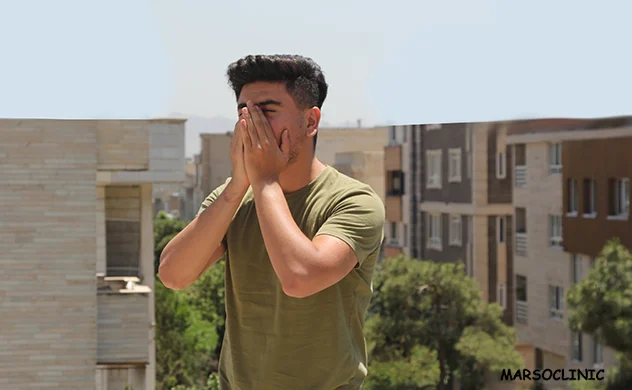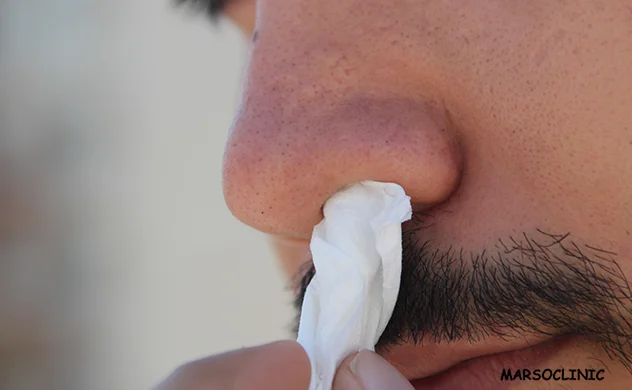
Associate Professor of Orthopedic expert,Brigham Hostpital
Have you ever felt sneezing and not being able to sneeze? Maybe you are a member of a group that sneezes a lot, but sometimes, despite the sense of sneezing, no matter how hard you try, you cannot get rid of this feeling as before.
- Nasal polyps
- Foreign body inside the nose
- Allergy
- Virus infections
- Sinusitis
- Cold weather
- spice
You are considered the significant cause for feeling like you have to sneeze but can’t.
Why do we sometimes sneeze and feel a stimulus inside our nose but not be able to sneeze?
If you have the above problem, we recommend that you read more. This article provides scientific information on this subject as simply as possible.

Why do we sneeze?
Sneezing is a reaction triggered to remove irritants that have irritated your throat and nose.
This is how scientists define sneezing:
Exhalation of air from the nose and mouth occurs involuntarily and powerfully. They call this involuntary and sudden process “sternutation.”
With all the pain you experience while sneezing, know that sneezing is generally not a sign of a severe problem in your body.
The mucous membranes in the nasal wall regulate the moisture and temperature of the air we inhale and send clean, moist air to the throat, trachea, and lungs.
Sometimes the impurities that enter our nose irritate the mucous membrane of the nasal wall and the body reacts to these stimuli by sneezing.
It is better to get acquainted with the factors that can stimulate the mucous membrane of the nasal wall and cause sneezing in the body.
Major causes for feeling sneezing
The following is a brief description of the stimuli of the nasal mucosa that can provoke sneezing:
When an external and foreign particle enters our nose or comes in contact with our mucosa, the body reacts to repel that foreign agent. Sometimes this allergic reaction becomes very harsh, which may result in anaphylactic shock and become fetal.
Generally, a healthy person's immune system protects the body's health against entering foreign and invading particles with these reactions.
Sometimes the immune system's response to allergens spreads to other body parts, such as itching and redness of the eyes or itchy skin and hives and rashes.
Sneezing is the body's response to allergens and diseases that have entered the body.
With the sudden and high pressure of air leaving the mouth and nose, the body tries to throw foreign particles out and away from the body.
Note the fact that the entry of non-respiratory allergens can also cause sneezing.
- Infectious and pathogenic agents:
There are more than two hundred types of viruses in the world that can cause the common cold.
These viruses are one of the most common causes of irritation of the nasal mucous membranes and sneezing.
Scientists consider a group of cold-causing viruses, generally known as the Rhino virus, to be a common cause of sneezing.
Entry of irritating particles into the nose such as dust, spicy particles, pepper, and ect.
Entry of cold air into the nose
Leaving drugs, such as opioids, can cause sneezing by irritating the mucous membranes.
Doctors say that although corticosteroid sprays are prescribed to reduce inflammation in the lining of the nasal mucosa and reduce the number of times of sneeze, it is sometimes seen that in those who use these sprays, the compounds in the spray also stimulate the ![]() mucus and sneeze. So you know what causes sneezing.
mucus and sneeze. So you know what causes sneezing.
In other words, irritation of the nasal mucosa causes itching and sneezing.
The following spices are considered to cause sneezing and allergies:
-
- Coriander
- Anis
- Fennel
- Celery
- Cumin
- Parsley
- Ragweed
- Dandelions
- Echinacea
- Artichoke
- Hibiscus
Breathing cold air can cause sneezing. Sometimes sneezing does not happen, but the feeling of sneezing persists.
We have lots of hallow cavities inside our skull bones. Some are large and some small. They may become inflamed because of infectious and non-infectious factors. Sinusitis can cause lots of problems, from persistent headaches to chronic coughing.
“ Feeling like you have to sneeze but can’t sneeze” also can be seen in persons with sinusitis.
How to get rid of this feeling
Sometimes, despite the stimulation, we feel like sneezing and need to get out of it, but despite our best efforts, we cannot sneeze.
What can we do in this situation?
Not being able to sneeze can be very annoying. This irritation will be even more annoying when the stimulus factors cause nasal congestion.
There are ways to stimulate sneezing, stimulating the nerve cells that trigger the sneezing process.
Here are some ways to induce sneezing:
- Insert a paper towel into your nostril:
Gently push it back and forth on the other end of the tissue that is out of your nose; this will cause a tingling sensation. This will stimulate large nerve branches called Trigeminal, and the process of sneezing will occur.

If you use this very carefully, the tissue should be long enough that you can control it from the outside, and also, do not insert the tubed tissue too much into your nose.
- You can pull a clean feather to the lower part of the nose, near your nostrils:
This action will also stimulate sneezing. It is recommended not to use natural feathers; artificial feathers are better for this. Never insert feathers into the nose.
- It is interesting to state that sometimes some can sneeze when they look at a bright light. Scientists and researchers say more than 30 percent of people can sneeze this way. This reaction is called light sneezing reflux.
Autosomal dominant compulsive helio ophthalmic or ACHOO
Scientists believe this reflex is probably the proximity of the trigeminal nerve to the optic nerve. This condition is hereditary, and anyone with this disorder will be able to sneeze when looking at bright light.
There will be a fifty percent increase in this disorder among the children of affected individuals.
If you want to know whether you are one of these individuals, you must suddenly look at a bright light. We emphasize that you should never stare at the sun. To use this advice, use only bright light because staring at the sun will cause irreparable damage to the eyes.
- Smell strong and cold scent perfumes:
Sometimes some perfumes and fragrances will cause severe and intense sneezing. You should never smell an aroma directly and never spray perfume directly into your nose.
To test this, it is enough to spray perfume in the air so that the particles can stimulate the lining of the nose and cause sneezing.
Bitter chocolate has a potent stimulant compound called cacao esto.
This substance can cause intense sneezing. Scientists have not yet found an exact cause for it, But researchers believe this phenomenon has nothing to do with allergies, and this solution will not be effective for everyone.
- Plucking hair inside the nose:
This action stimulates the trigeminal nerve. Stimulating this nerve causes sneezing.
This action is especially suitable for people who have a feeling of sneezing but are not able to sneeze. If you have a sense of sneezing and nasal irritation but cannot sneeze, use this method; you need to bend your head back and look upward gently.
- You can smell the spices:
Peppers, chopped cumin, and chopped coriander seeds stimulate the nasal mucosa.
Black and white pepper have a stimulant compound called piperine that strongly stimulates the respiratory mucosa.
Capsaicin is also found in red and hot peppers and can naturally activate the sneezing reflex.
It would help if you did not dip your nose into the spices to do this.
Open the spice box and gently twist it around your nose or chop a pepper; this can stimulate the sneezing reflex.
Be aware that the direct smell of hot spices and pepper can cause sore eyes and nose.
- Sudden plucking of hair from the eyebrows:
This action is accompanied by stimulating the motor sensory nerves of your face. Plucking hair from the eyebrows can be accompanied by stimulating the trigeminal nerve and sneezing.
Massaging the nasal septum can stimulate the trigeminal nerve and provoke sneezing. Sometimes squeezing the nose is the only way to start the sneezing process.
People sometimes say that when they stick the tip of their tongue on the roof of their mouth, they become irritated and sneeze. The cause of this phenomenon is the stimulant of nerves under the top of our mouth.
The amount of pressure required and the duration of stretching to induce sneezing vary from one to the other.
- Exposure to cold air can also trigger sneezing:
For example, leaving the house and going to a cold environment outside the house and taking a few deep breaths, turning on the air conditioner in the summer and taking some deep breaths, or opening the freezer and taking a few deep breaths may help.
The final words
We emphasize that although we have mentioned various types of sneeze-producing methods for those unable to get rid of the feeling of sneezing, you should know that not all will benefit from these, nor each process has a one hundred percent success rate.
In other words, because not all people respond to stimuli in the same way, the methods of inducing sneezing are different from person to person.
Also, the trigeminal nerve of the face, the stimulation of which plays a significant role in causing sneezing, has different levels of irritability and response to stimulation in other people.
Always use the stimuli mentioned above carefully and gently. Never insert sharp objects into your nose to induce sneezing.